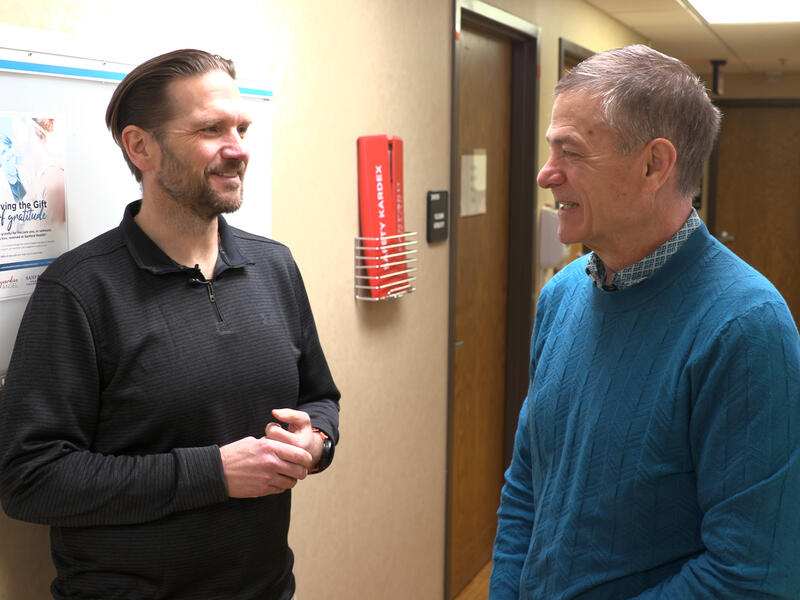John Grunewaldt is no stranger to donating life.
In his 70 years, he’s made a habit of donating blood whenever he could.
“It gives you a satisfaction. You made a difference in somebody’s life,” he said.
But those donations have come full circle. He is now alive today because of someone else.
‘I didn’t realize how sick I was’
In 2022, he simply thought he couldn’t shake a cough. Weeks went by, and Grunewaldt wasn’t improving. He went in for a biopsy, and providers told him his kidney was failing and put him on dialysis.
“I did my own dialysis at home at night every day, and then just waited for a kidney transplant. I had to mentally prepare myself for the long term. It could be five to six years before I got one,” he explained.
Enter Ken Schaaf. You’ll often find him out pounding the pavement on the Sioux Falls, South Dakota trails.
He runs marathons, but he wasn’t always this way.
“I’d run at night so people couldn’t see me,” he said.
Wanting to donate
Years ago, his mother-in-law passed away from non-Hodgkin’s lymphoma. She needed a bone marrow transplant, but none of her family members were a match.
Since then, he’s always wanted to be a donor, of any kind. He had the idea of donating a kidney, and worked with Sanford Health to see if he was healthy enough to do so.
Turns out, he wasn’t.
“The first time I started these trials, I was not in good enough shape to do it. I was overweight. My labs were off. I started thinking I really should be taking better care of myself,” said Schaaf.
He started eating better. He picked up running.
“I was never a runner. Never ever. I ran like two miles on the treadmill, and I thought that was the greatest thing ever. So then, it just kind of snowballed from there,” said Schaaf.
His health improved. Fast-forward to March of 2023, he was approved to donate a kidney.
“Ken is, I call him a force of nature,” said Mohammad Qamar, M.D., a transplant nephrologist at Sanford Health in Sioux Falls. “He is a phenomenal person to get to know. He wanted to do this good thing for essentially a complete stranger.”
Feeling protected at Sanford
Schaaf said he felt protected working with Dr. Qamar throughout the entire process leading up to his donation.
“A lot of medical tests. Psychology tests, more medical tests, everything. One of the things that I thought was interesting was right before the donation, they asked if I knew that I had had West Nile (virus) at one point in my life.
“So, all the tests go in that much depth that they could see that at one point in time in my life I had West Nile (virus), even though I never knew I had it,” he said.
He donated his kidney to the national kidney registry on March 28. On May 20, he was already running races again.
“I finished,” he said, chuckling.
Because Schaaf donated his kidney to the National Kidney Registry, it opened up a kidney for Grunewaldt to receive.
He was prepared to wait five to six years. He fortunately only had to wait about eight months.
Dr. Qamar called Grunewaldt and told him he had a kidney for him. Grunewaldt said that phone call evoked an emotion he’ll never forget.
“It’s like you won the lottery. All of a sudden, it hits you that it’s real. This is really going to happen. There was somebody out there making a difference for you, and you can appreciate that to the point where your whole life changes,” he said.
The need for donors
Dr. Qamar said it’s special that Grunewaldt was able to receive a kidney, due the nationwide demand.
“There are roughly 90,000 people waiting to get a kidney. Out of those, last year, we had about 26,000 transplants. So, there’s a huge gap. Roughly 6,000 of those were living kidney donations,” he said.
He explained that since the National Kidney Registry started in 2007, they’ve been steadily chipping away at filling that gap.
He said the best way to ensure that a kidney goes to someone in need as quickly as possible is through the National Kidney Registry. He and others at Sanford Nephrology help patients get on to the registry every day.
“Data shows that if one is registered through the National Kidney Registry, the wait time is less than three months for most people that are listed. For 80%, it takes 90 days or less,” he said.
Protections for both the donor and recipient are built into the National Kidney Registry program.
“We tell people that are thinking about donating a kidney that we don’t just care about the recipient. We absolutely do, but we care just as much about the donor because for this to be a success, we want both people to be happy and to live out their lives to the fullest,” said Dr. Qamar.
And both Grunewaldt and Schaaf are living their lives to the fullest. Schaaf continues to run religiously. And Grunewaldt and his wife, who recently planned a surprise 70th birthday party for him, bought an RV and are planning to do lots of traveling this summer.
Learn more
- Driver delivers kidney despite being stuck in ND blizzard
- Transplant program going strong 1 year, many patients later
- Living organ donation winds up saving two lives
…
Posted In Dialysis, Healthy Living, Organ Donation, Sioux Falls, Transplant

